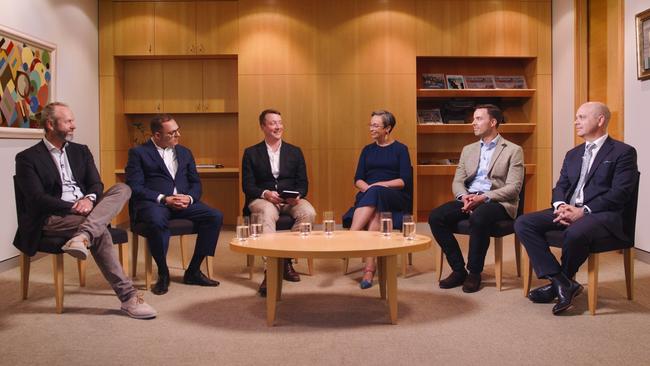Australia must play a part as nations chart AI governance
Australia can set an example as the need for innovation is weighed against the ethics and responsibility associated with the use of artificial intelligence, an industry panel has been told.

-
-
Australia is being urged to take a lead role in the regulation of AI, as the government looks to walk the tightrope between enabling innovation and ensuring AI-based language models are used ethically and responsibly.
An industry panel hosted by The Australian and Nuix, and featuring executives from venture capital firm AirTree, the Australian Information Industry Association (AIIA), Gilbert + Tobin and The Australian National University, heard that while generative chatbots like ChatGPT are becoming smarter and more widespread, concerns are growing around issues like misinformation and the potential for job misplacement.
Simon Bush, chief executive of peak IT body AIIA, said that Australia should be pro-actively helping build global rules around AI rather than waiting for others to take the initiative, and therefore reap the benefits.
“The question around putting the genie back in the bottle, and if we should slow down, the answer is no, we should not be,” Mr Bush told the panel (part 1 of excerpt from the panel discussion below and part 2 here).
“There’s massive productivity benefits for our economy, and why would we as an economy stop that if we could? And if we stopped it as Western economies, do you think China and Russia would stop their development of AI? It’s not practical, and it’s not, in fact, doable.
“There has been a lot of AI innovation being done in this country, and it’s a really good thing.”
The AIIA, in its submission to the government’s review into developing rules for ethical AI, seen by The Australian, pointed to statistics from the CSIRO and Data61 that show by 2030, AI benefits could be worth $22.17 trillion to the global economy. It also said Australia currently lacks the productivity drivers it needs to power its economic growth, however.
The key to improving this growth rate could be AI, according to the AIIA. It said there were productivity gains to be realised from businesses automating processes — including the use of robots and autonomous vehicles — as well as from businesses augmenting their existing labour force with AI technologies.
Productivity should also receive a boost from increased consumer demand resulting from the availability of personalised and higher-quality AI-enhanced products and services.
“I think Australia should be at the table,” Mr Bush said. “Australia’s government should be at those ISO standards tables, we should be developing those frameworks, and there’s a critical tech component of that.
“We can work with India, Japan and the US in developing those frameworks.”
He added that the federal government should be an exemplar when it comes to AI governance and adoption within their own departments, and that the private sector would follow its lead.
Yet, as John Henderson, General Partner at leading local venture outfit AirTree Ventures notes, a seat at the international AI regulation table must be earned through meaningful innovation. This is where Australia’s potential truly lies – in nurturing an environment that fosters AI research and nurtures real-world machine learning productisation.
Before joining AirTree, Mr Henderson led product at an AI start-up, Summly, which was acquired by Yahoo in 2013. His venture fund has invested in a number of companies building out AI technologies, including Canva, autonomous inspection provider Abyss Solutions, and workplace software maker Joyous.
“The countries that are going to be at the table exerting their influence here are the countries from which the important technologies emerge,” Mr Henderson told the panel.
“The US is the centre of this right now, and you see Rishi Sunak doing all kinds of interesting things in the UK, partly because Deep Mind emerged from there and has become an important player. I think if we want to have a voice at the international table, we need to have a bunch of innovation come out of this country. And so, we should focus on designing policies to attract core research and encourage real machine learning productisation out of this country. And I think if we can achieve that, then we will deserve a place and a voice at the table.”
Mr Henderson suggested Australia look to the UK and its fintech regulatory sandbox as an example of what the government should be considering when it comes to safe experimentation and innovation in AI.
“The FCA [Financial Conduct Authority] in the UK basically created an area in which fintechs could explore things that may or may not contravene regulations, and then analyse the results and then give them a path to regulatory licensing that policy,” Mr Henderson said.

“That was a major contributor to the UK becoming a fintech hub of the world. I don’t know what the machine learning version of that is, but I think while we’re still in this phase of uncertainty and exploration, rather than sort of writing down black letters of what the rules and guidelines should be, the government has a role in creating a space where innovators can experiment.”
Australian tech outfit Nuix, which specialises in investigative analytics and intelligence software has for the past few years been incorporating AI functionality to its latest Nuix Neo platform, which uses language models to help clients speed up forensic investigations and increase accuracy.
Nuix chief executive Jonathan Rubinsztein said that Australia is fast approaching a landmark moment for AI. He pointed to the rapid rise of ChatGPT, which currently has an estimated IQ of 155, superior to 99.9 per cent of human test takers.
“Now the question is when ChatGPT has an IQ of a 1000 or 10,000, and it can reproduce itself and write its own code, I think there are certain frameworks that need to be put in place, and that we consider the risk,” he said.
“I think there’s a lot of a doomsday kind of hype and fear that I’m not sure is appropriate, but we are reaching singularity where one machine equals one human brain. And when we do reach singularity, that doesn’t mean that we need to be afraid. We need to consider how we get some regulations in place to manage the risks. And there are risks, however this global challenge can be met with global principle-based regulatory standards, and Australia can and must play a lead role here.”
Professor Johanna Weaver, director of the Tech Policy Design Centre at ANU, said that there needs to be more acknowledgement of the laws that currently exist and already apply to AI.
She said Australia’s discrimination, negligence, contract, and corporate laws among many others regulate AI today.
“These tools are not being developed in a legal vacuum,” she said. “There are a number of international standards that are being negotiated that will be increasingly influential.
“Education is equally important, not just for users, but also for the people designing the tech,” she said.
“Innovators design tech to solve problems. I applaud this. But history is replete with examples of tech designed ‘for good’ that was subsequently used ‘for bad’. This isn’t a reason to stop innovating, but it is a reason to innovate differently.
“Imagine if every innovator considered security, privacy, and safety as essential components of any technical solution. That shift in mindset and design practice would have as much positive impact on the way tech evolves into the future as any regulatory framework.”
-
This content was produced in association with Nuix. Read our policy on commercial content here.
-



